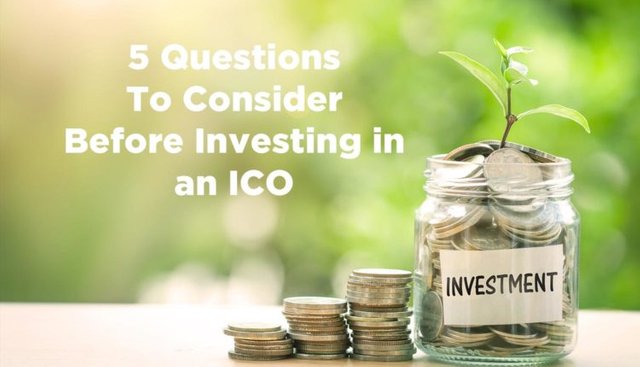5 Questions You Should Ask Yourself Before Investing in an ICO. - @Digitex
- What level of risk are you comfortable with?
Are you interested in investing in an established cryptocurrency or token, or are you willing to take a greater risk in investment?
The main difference between buying an ICO token and buying an exchange token is the level of risk involved. With greater risks come greater rewards. However, in many cases, the risks are quite significant.
If you buy a cryptocurrency or token which is already circulating on one or more exchanges, there is already trade volume, meaning that investors are regularly buying and selling the token. If you invest in an ICO, there is no guarantee that the project will be completed and that the token will hit exchanges. This could be for a number of reasons, including the collapse of the initial project, an ‘exit scam’—i.e. when a fraudulent project has collected your tokens and then disappears—or, there could be significant delays in project development, which result in the token taking much longer than expected to be listed on exchanges.
If you are more comfortable investing in established cryptocurrencies, it may be best to focus on Bitcoin, Ethereum, Litecoin, NEO and other top cryptocurrencies, as well as established ERC-20 or ERC-223 tokens. If you are interested in a much higher potential return, but with a much greater risk, then you can consider investing in an ICO.
- Are you a value investor or do you want to turn a quick profit?
There are several types of investors. There are value investors, for example, who look at the fundamentals of a project.
All-too-often, however, there are large numbers of short-term investors who want to gain a 2x their investment and dump their tokens. These investors are always chasing the next pump, and they dump their tokens whenever they can make a profit. This accounts for the large number of pump-and-dump groups on Telegram and other places, where people are constantly buying and selling the next big thing. This is akin to day trading, in which investors constantly follow the market and buy and sell to make short-term gains.
If your goal is to make a quick profit, ICOs are incredibly risky. In all likelihood, that next newly-hyped ICO project may come to nothing at all, and you can lose your initial investment. If you are interested in the value of the project itself and believe that it has long-term prospects, you are more likely to make a good long-term profit.
- Is there a market for the project and what problem does it solve?
Do we need a token for the dental industry? Is there a market for tokenizing refrigerators? Perhaps not. This is, perhaps, the main thing you should consider when investigating a potential blockchain-based investment. While no investment is guaranteed, it is important to make sure that you are investing in something which you can really understand, which has a clear and defined market, and which solves a problem that buyers or users want solving.
Remember to bear these questions in mind: who needs this token, what problem does it solve, and how does it work? Make sure you can answer these three questions before investing in any ICO.
The Digitex Futures Exchange, for example, provides zero-commission futures trading. This is a clearly-defined niche within the market, and it provides a token which has clear utility within the platform.
- Who are the team behind the project and can they deliver?
A great idea without a great team behind it is a sure dead end. Everyone has brilliant ideas from time to time, but only an effective, qualified and highly-skilled team can carry such ideas to fruition.
Most ICO websites have a list of team members. Look at the name of the CEO, developers, contributors and other partners and look them up via LinkedIn and Google.
Key points to consider: have they worked on other projects before, and, if so, have those projects been successful? If you’re looking at the founder or head of a project, his or her previous background in business is crucial. Was the individual a CEO of a previous project, did he/she achieve success, and why did they move on to the current project? Likewise, we can evaluate the previous work and achievements of the developers and the reliability of the company’s strategic partners.
- When will the project be delivered?
This is a key question because you need to consider the timeframe of your investment, and it is important to be able to estimate how soon you can expect to receive a potential return on your initial capital. However, this depends on a number of factors, including the project’s launch date, and when its platform or services will be up and running. Usually, this is expressed in terms of quarters of the year.
On the ICO website, there should be a roadmap, which will specify in which quarter each stage of development will be completed. Thus, an ICO may take place in Q1 (January, February or March), Q2 (April, May, June), Q3 (July, August, September), or Q4 (October, November, December). Make sure you thoroughly consider the roadmap before investing.
Most of all, thoroughly consider how much you are willing to invest, and never invest more than you are willing to lose. Investing in ICOs, like investing in startups, is incredibly risky, and even seasoned investors can lose money from time to time. So, remember, do your own research (DYOR) and good luck.

Coins mentioned in post: